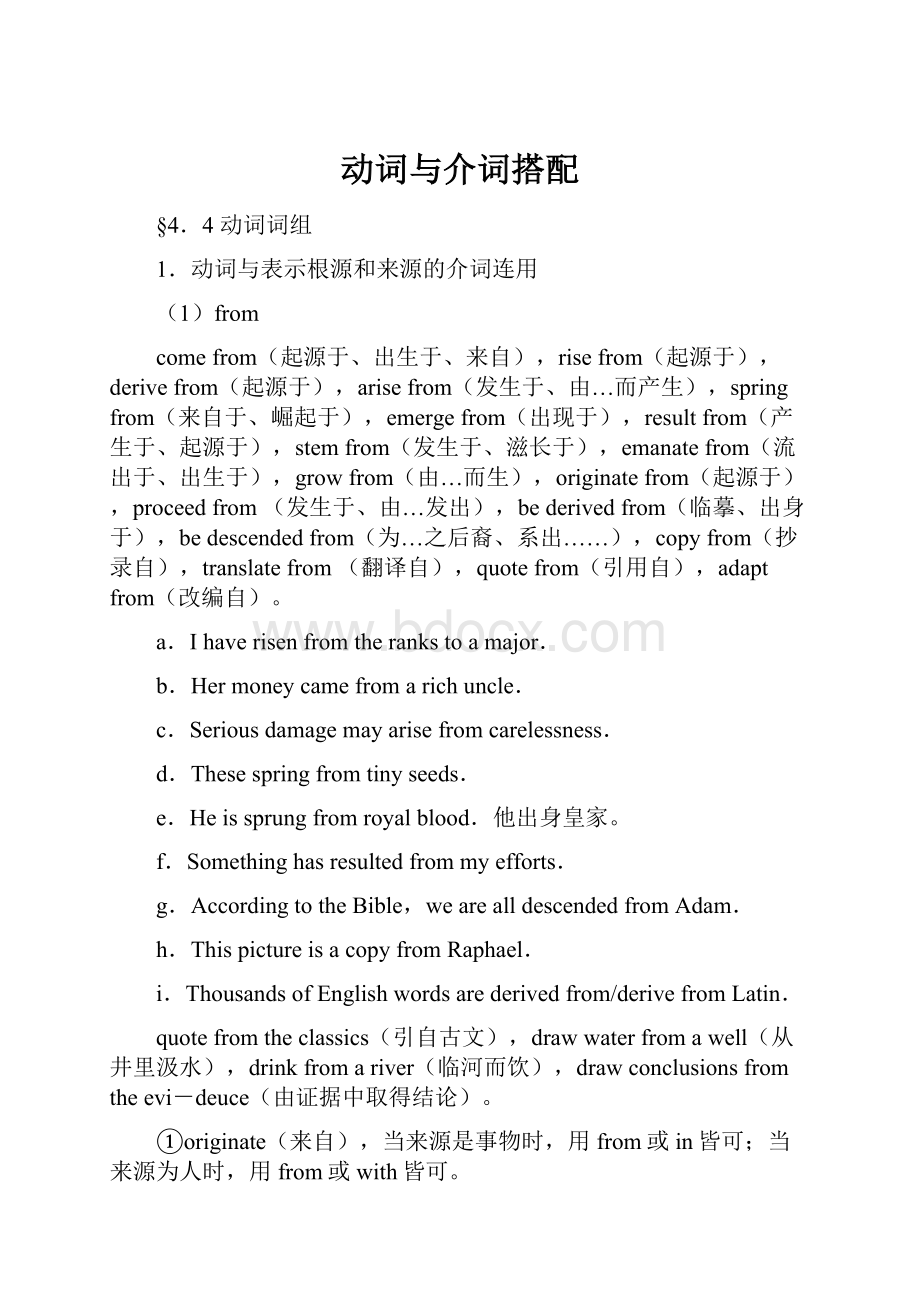动词与介词搭配.docx
《动词与介词搭配.docx》由会员分享,可在线阅读,更多相关《动词与介词搭配.docx(42页珍藏版)》请在冰豆网上搜索。

动词与介词搭配
§4.4动词词组
1.动词与表示根源和来源的介词连用
(1)from
comefrom(起源于、出生于、来自),risefrom(起源于),derivefrom(起源于),arisefrom(发生于、由…而产生),springfrom(来自于、崛起于),emergefrom(出现于),resultfrom(产生于、起源于),stemfrom(发生于、滋长于),emanatefrom(流出于、出生于),growfrom(由…而生),originatefrom(起源于),proceedfrom(发生于、由…发出),bederivedfrom(临摹、出身于),bedescendedfrom(为…之后裔、系出……),copyfrom(抄录自),translatefrom(翻译自),quotefrom(引用自),adaptfrom(改编自)。
a.Ihaverisenfromtherankstoamajor.
b.Hermoneycamefromarichuncle.
c.Seriousdamagemayarisefromcarelessness.
d.Thesespringfromtinyseeds.
e.Heissprungfromroyalblood.他出身皇家。
f.Somethinghasresultedfrommyefforts.
g.AccordingtotheBible,wearealldescendedfromAdam.
h.ThispictureisacopyfromRaphael.
i.ThousandsofEnglishwordsarederivedfrom/derivefromLatin.
quotefromtheclassics(引自古文),drawwaterfromawell(从井里汲水),drinkfromariver(临河而饮),drawconclusionsfromtheevi-deuce(由证据中取得结论)。
①originate(来自),当来源是事物时,用from或in皆可;当来源为人时,用from或with皆可。
②comefrom有两个含义:
一是表示“籍贯(出生于何处)”=comeof;一是表示“来自何处”。
其区别在于动词时态的不同。
当表示“籍贯”时,动时用现在时,因籍贯是永远不变的。
当表示“来自何处”时为叙述过去的事情,故用过去时或现在完成时。
试比较:
a.Wheredoyoucomefrom?
你籍贯何处?
(以现在时构成问句)
IcomefromBeijing.我是北京出生的。
b.Wheredid/haveyoucomefrom?
你来自何处?
Icame/havecomefromBeijing.我从北京来。
(不一定是北京人)
(2)of
①ask(要求、请求、询问)
ask的对象为人时,可用asksb.或askofsb.;asksth.ofsb.表示“请求某人做某事、或询问某人某事”。
a.MayIaskafavourofyou?
b.MayIaskaquestionofyou?
c.Heaskedhiswayofahunter.
②beg(请求、要求)
a.Hebeggedafavourofme.
b.Hebeggedmoneyofcharitablepeople.
③inquire(询问、探询)
inquire的宾语为人时,不能直接接人,须接介词of再接人,成为inquireofsb.。
如欲表示“询问某事”时,须用介词about:
inquireofsb.aboutsth.,意为“询问某人某事”。
inquire的宾语为地方时,接at:
I'llinquireattheofficeandthentellyou.我去办公室打听一下再告诉你。
a.Iinquiredofhimthewaytotown.
b.Heinquiredofmethebestwaytogo.
c.Iinquiredofhimaboutthematter.
d.Sheinquiresofhimaboutheryoungerbrother'sconduct.
④require(要求)
如仅表示“向某人要求”时,require后接of再接人,成“requireofsb.”的形式。
如欲表示“要求某人做某事、向某人要求某物”时,用requiresth.ofsb.句型。
a.Ihavedoneeverythingthatwasrequiredofme.
b.Whatdoyourequireofme?
c.Sherequiredanapologyofme.她要我道歉。
⑤demand(要求)
demand必须加of再加被要求的人,demandofsb.表示“向某人要求”。
demandsth.ofsb.表示“向某人要求某物(做某事)”。
试比较:
a.我要求他答复。
Idemandhimofananswer.
Idemandananswerofhim.
b.Hedemandstoohighapriceofme.
⑥comeof(出身、出自),bebornof(出生)
a.Hecomesofancientfamily.
b.Shewasbornofgoodparents.她出身良家。
a)from与of皆可用以表示“起源、出处”,但何时用from,何时用of,须视动词而定。
因此对于from和of所跟的动词必须加以区别熟记。
b)of,from皆可用以表示“种族、门第”,但何时用from,何时用of,亦决定于动词的不同。
一般spring,bederived,bedescended接from,come,beborn接of。
c)某些动词之后可接from或of,意义相同,但接from居多。
此类动词大多表示“获得、期望”之意,如buy,borrow,hire,receive,learn,have(得到),expect,want等。
a.ShelearnedherEnglishof/fromanAmerican.
b.Allthesebooksmaybehadof/fromanybooksellers.
c.Everyoneexpectedgreatthingsof/fromhim.
d)comefrom表示“籍贯”或“来自何处”。
comeof则表示“出身、家庭”。
试比较:
a.HecomesfromTianjin.他籍贯是天津。
b.Hecamefrombeyondtheseasyesterday.他昨天从海外来。
c.Hecomesofgoodfamily.他出身良家。
d.Hecameofapoorpeasantfamily.他出身于贫穷农家。
(3)outof
askoutof(由…而发问),pickoutof(由…挑选),writeoutofone'sownhead(创作),payoutofone'sownpocket(自己出钱)。
a.Heaskedoutofcuriousity.
b.Youwillhavetopayoutofyourownpocket.
2.动词和表示推断的介词连用
(1)from
judgefrom/by(由…判定、由…判断),concludefrom(由…判定),inferfrom(由…推论、由…推断),deducefrom(由…推论、由…推断),judgefrom/byappearance(以貌取人),speakfromexperience(经验之谈),paintfromnature(模仿自然作画、写生)。
a.Judgingfromwhatyousay,heoughttosucceed.
b.Judgingfrom/byhisappearance,heseemstobeamanofgoodconduct.
(2)by
judgeby,knowby(由…知),callby(据…而叫),tellby(由…知),recognizeapersonbythevoice(依声音辨别某人)。
a.Amanisusuallyjudgedbywhathedoes.
b.Heiscalledbythenameofhisfather.
c.Amanisknownbythecompanyhekeeps.
观其所交,而知其人。
3.动词和表示比较的介词连用
(1)to
compareto(把…比作),likento(与…相象),prefer…to(较喜欢…而不喜欢…),其中to为介词。
a.Lifeiscomparedtoavoyage.人生好比航海。
b.Lifeislikenedtoanactofthestage.人生好比舞台上一幕戏。
c.Ipreferdeathtodishonour.
d.Ipreferworkingtodoingnothing.
(2)with
comparewith(与…比较),contrastwith(对照、对比),increasewith(随…而增加),varywith(随…而变化)。
a.HisEnglishcannotcomparewithmine.
b.Thatwillshowagreatincreasecomparedwithtoday.
c.Icontrastthispicturewiththat.
d.Youmaycontrastthisbookwithanotherone.
e.Anarmy'spowerincreaseswithitssize.
f.Thesizevarieswiththetemperature.
4.动词和表示原因及动机的介词连用
(1)from
sufferfrom(受…之苦),actfrom(由…而行动),diefrom被用做表示死亡之原因时,其含意是由于外界添加的刺激或影响而致死的,而不是出于本人自身的原因。
常见的还有:
diefromsomeunknowncause,diefromablow,diefromfatigue,diefromawound,diefromover-work,diefromdrinkingtoomuchwine,diefromhunger,diefromthememoryoftheworld(为世人所忘),diefrom/ofapoplexy,diefromweakness,diefromtheeffectsofoverexposuretothesun。
a.Hesuffersfromagreatlossinbusiness.
b.Heisnowsufferingfrominfluenza.
c.Heackedfromasenseofduty.责任感使他采取了行动。
d.Thebabydiedfromlackofcare.
e.Hediedfromablow.
f.Thelittlechilddiedfromeatingtoexcess.
g.Shediedfromsomeunknowncause.
(2)of
dieof用于表死亡的原因时,最常用的是“因…疾病而死亡”,of在此用法中常用:
dieofadisease,dieof(an)illness,dieofsorrow/love,dieofdiphtheria,dieof/fromapoplexy,dieofadecline,dieofdisappoint-ment,dieofhunger,dieofthirst,dieofabrokenheart,dieof/withgrief,dieofoldage,dieofexhaustion,dieofafall,dieoffever(consumption,cold,smallpox,typhoidfever,congestionofthebrain)。
a.Hediedofaheartattack.
b.Shediedofhighfever.
(3)at
at常和表示情绪或感情的动词连用,如wonder,marvel,tremble,shudder,rejoice,cry,blush,weep,grieve,hesitate,laugh等。
dieat亦表示死亡的原因,常用如下情形:
dieatthestake(焚死、受火刑而死),dieatone'spost(殉职)。
a.Peoplewonderathislearning.
b.Theyrejoicedatthenewsofhissafereturn.
c.Shetrembledatthesoundofbursting.
d.Heshudderedatthesightofblood.
e.Hehesitatedatthedifficulty.
f.ShealwayslaughedatagoodJoke.
(4)for
diefor表死亡原因时,有指“为某一目的、事业而死”的意义:
dieforone'scountry,dieforone'sfaith,dieforsomecause(为了某种事业而死),dieforacrime(因罪而死)。
a.Theydiedfortheirmotherland.
b.Hediedforhiscountry.
(5)with
with表示原因时,是指由于外界的某种变化而影响到体内或内心的某种变化的心理原因。
常与如下动词连用:
chatter,tremble,quiv-er,shiver,shake,shudder,totter,burst,foil,burn,kindle,seethe(激动),simmer(激动),cry,exclaim,weep。
diewith表示死亡原因时,多用于由于某种感情、情绪而导致的死亡。
如diewithhorror,diewith/forjoy(由于病极而死),diewithlaughing。
a.Hisvoicetrembledwithangry.他的声音因愤怒而颤抖。
b.Sheshookwithlaughter.她笑得全身抖动。
c.Thepeopleseethedwithdiscontent.人们因不平而骚动。
d.Healmostburstwithlaughter.他几乎放声大笑起来。
e.Shediedwithhorror.她吓死了。
f.Shediedwith/for/fromoverjoy.
(6)over
over指由于某原因或事件而产生的心理活动或感情冲动,常和如下动词连用:
cry,weep,laugh,rejoice,mourn,grieve等。
a.Welaughoverhisfoolishoperation.
b.Shewascryingoverhermisfortunes.
c.Sheweptoverhersadfate.
d.Weallrejoiceoverthevictory.
e.Shegrievedoverhermisfortunes.
f.Heisfoolishastocryoveranovel.
g.Theyrejoicedoverthegloriousvictory.
(7)in
diein表示死亡原因时,用于下列情形:
dieinbattle(战死),dieinone'sbed(老死),dieinpoverty,dieinannoy,dieinaditch,dieinchildbed/childbirth(因生产而死),dieinone'sboots(横死、死于非命),dieinharness(殉职)。
a.Hediedinhisbed.
b.Hediedinhisboots.
(8)on
dieon表示死亡原因时,常指如下情形:
dieonthescaffold(死在刽子手之手),dieonthebattlefield(战死)。
(9)by
dieby表示死亡原因时,常指如下情形:
diebyviolence(死于非命、横死、惨死),diebythesword(死于刀剑之下),diebyhanging(缢死),diebypestilence(死于流行的疾病),diebyone'sownhand(自杀),diebydrowning(溺死)。
5.动词和表示理由的介词连用
for常与dismiss,punish,blame,suffer,reward等动词连用,表示赏罚的理由,如winamedalforbravery,sufferforone'ssins,senttoprisonforstealing。
a.Heavenhasrewardedhimforhishonesty.
b.Hewasrewardedforsavingthegirl'slife.
c.Hewaspunishedforstealing.
d.Hewasdismissedforneglectinghiswork.
e.Youwillsufferforyourwickednesssomeday.
sufferfor和sufferfrom有区别,sufferfor后接的原因大都是主语做的坏事(如犯罪等),而sufferfrom后接不是原因,而是遭受的对象,意即给主语带来痛苦的东西(如贫穷、疾病等)。
for与apolo-gize,makeup连用,表示“补偿”之意。
f.Youshouldapologizeforyourrudeness.
g.Wemustmakeupforlosttime.
6.动词和表示品质、材料、构成成份的介词连用
(1)of
表示“材料、由…做成”,of后的材料与成品性质相同,只发生物理变化。
(注意与from的区别),常用的有:
makeof,buildof,formof,weaveof,createof,常用作被动语态。
表示“组成成分”,of常与下列动词构成成语:
consistof(由…组成),becomposedof,bemadeupof,beformedof。
consistof中无be动词,以上几个成语可以互相换用。
a.Bottlesaremadeofglass.
b.Thishouseisbuiltofstones.
c.Theclothiswovenofsilkandgold.
d.Manconsistsofsoulandbody.
e.Watermadeupofoxygenandhydrogen.
f.Japanisformedoffourlargeislands.
(2)from,outof
from表示“由…制成”,是指成品与原材料之间发生了质的变化即化学变化,如:
Wineismadefrompineapple.
当材料变质与否不明时,可用of或from。
若以材料为主语,而以成品为宾语,则用into,而不使用from或of,而outof表示“由…做成的、什么材料被做成为什么成品”之意。
a.Breadismadefrom/offlourandwater.
b.Flourismadeintobread.
c.Wemakepaperintomanythings.
makeof原是makeoutof的省略形式,故makeoutof也指物理变化,当make和of分开时,用makeoutof,否则用makeof。
试比较:
d.Manyusefulthingsaremadeofpaper.
Wemakemanythingsoutofpaper.
e.Manythingsaremadeofbamboo.
Wemakemanythingsoutofbamboo.
虽然把make和of分开,但表示“造就成…、当成是…”的意义时,则仍使用of而不用outof。
f.Iwillmakeateacherofyou.我将使你成为教师。
g.Shewillmakeafoolofhim.她将愚弄他。
(3)in
表示“用…原料、用…语言”意义,in常和write,speak,castem-broider,paint,answer等动词连用。
a.Hepaintedinoils,butIpaintedinwater-colors.
b.Youmustwritelettersinink.
c.CanyouansweritinEnglish?
d.Thedesignisembroideredingold.
e.Thestatuewascastinbronze.
f.Hedidnotwriteitinink,butwithapencil.
在表示“材料”时,in常和with混用,须特别注意。
in表示“材料”,而with表示“工具”,如“我将用墨水写封信”是:
Ishallwritealetterinink.而不是用withink,因为ink为原料而非工具,再如下例则更易混错:
writeinpencil/chalk;表示“工具”之意时,则须用writewithapencil/apieceofchalk。
判别方法:
①物质名词:
表示材料,此时一般用in。
②普通名同:
可表示材料与工具,当该名词前无冠词也不是复数形式时,一般表示材料用in;如有冠词或用复数形式,一般表示工具,用with。
in表示“穿戴衣服、鞋子”等时,常和bedressed,clothed,clad(穿衣),attired(穿着),arrayed(穿着)等连用。
a.Weusuallywriteinblueink.
Weusually